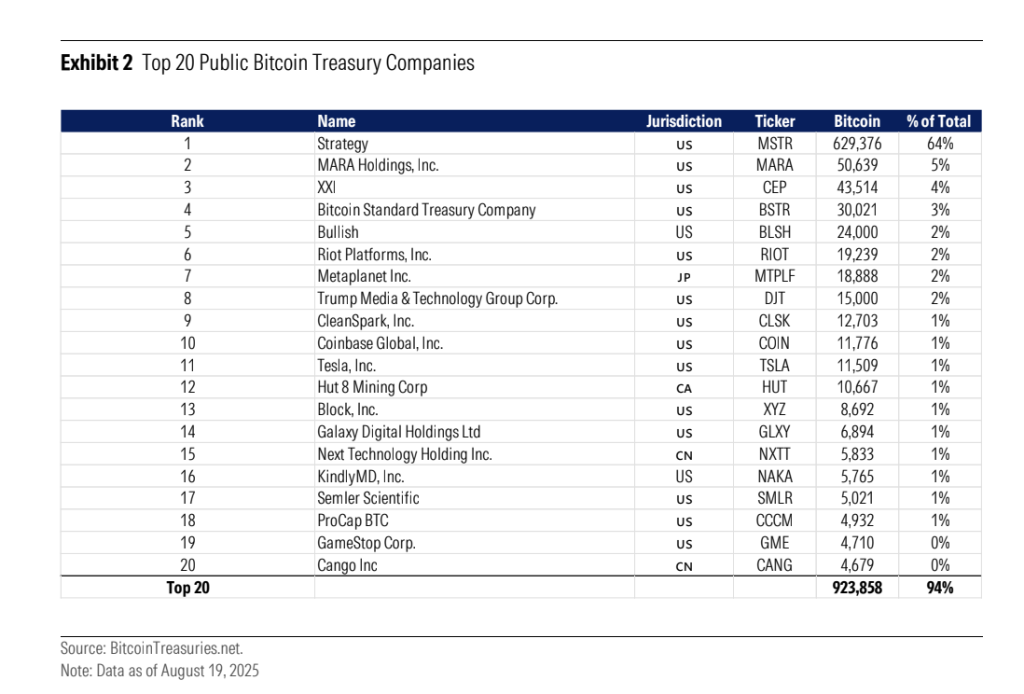Corporate Bitcoin Reserves: The Bold Treasury Move That Could Backfire on Credit Ratings
Wall Street analysts sound alarm bells as companies pile into Bitcoin treasury reserves—warning that volatility could hammer creditworthiness.
The Digital Asset Dilemma
Corporations chasing crypto yield face unprecedented scrutiny from rating agencies. Bitcoin's wild price swings—often swinging 10% in a day—create balance sheet instability that traditional lenders never anticipated.
Rating agencies now scrutinize crypto holdings with hawk-eyed skepticism. One analyst quipped that corporate treasurers treating Bitcoin like cash equivalents might need their own risk assessment.
While some praise forward-thinking adoption, others see reckless speculation with shareholder funds—because nothing says financial prudence like betting the corporate treasury on digital assets that might crash before quarterly earnings.
Concentration and Market Exposure
Morningstar analysts note that corporate bitcoin holdings remain concentrated among a handful of firms, with Strategy Inc. alone holding over 629,000 bitcoins — roughly 64 percent of all public company bitcoin treasury holdings.

Michael Saylor’s Strategy has been adding to its reserves at a rapid pace, snapping up bitcoin almost weekly in recent months as part of an aggressive accumulation strategy.
Strategy has acquired 430 BTC for ~$51.4 million at ~$119,666 per bitcoin and has achieved BTC Yield of 25.1% YTD 2025. As of 8/17/2025, we hodl 629,376 $BTC acquired for ~$46.15 billion at ~$73,320 per bitcoin. $MSTR $STRC $STRK $STRF $STRDhttps://t.co/8zSHvPTFJO
— Strategy (@Strategy) August 18, 2025The top 20 public companies collectively control an estimated 94 percent of corporate bitcoin reserves, underscoring how concentrated this exposure remains.
In total, approximately 3.68 million bitcoins, valued at around $428 billion as of August 2025, are held across corporations, ETFs, governments, and custodians. This represents nearly 18 percent of the current circulating supply, says Morningstar.
While the growth in adoption shows confidence among corporates and investors, reliance on such a volatile asset for treasury management introduces substantial challenges.
Morningstar analysts caution that concentration risk coupled with the high market volatility of cryptocurrencies could complicate liquidity planning and affect corporate balance sheets during periods of stress.
Risks Facing Corporate Treasuries
Morningstar DBRS analysts identify a range of risks for companies adopting a cryptocurrency treasury strategy. Regulatory uncertainty remains one of the most pressing challenges, with no uniform global framework governing cryptocurrencies.
Although countries such as the U.S. and those in the eurozone have introduced clearer rules, these remain in flux, leaving corporates exposed to shifting compliance obligations.
Liquidity also presents a concern. While digital asset markets have grown considerably, they can still thin out during times of volatility. In such moments, transactions may be delayed, and spreads can widen, undermining the reliability of cryptocurrency reserves as a financial backstop.
Counterparty and security risks further complicate the landscape, as many firms depend on centralized exchanges for both trading and custody. Recent disputes, such as the SEC’s lawsuit against Coinbase — which was eventually dropped in 2025 — highlight the evolving and unpredictable regulatory environment surrounding major platforms.
Another factor is the materiality of digital asset holdings on corporate balance sheets. Treasury functions are designed to safeguard financial stability and ensure liquidity, but when bitcoin becomes a company’s primary reserve asset, its volatility can undermine these objectives.
A June 2024 study found that bitcoin was nearly five times more volatile than the S&P 500 in the short run and four times more volatile in the long run, suggesting significant exposure to price swings, acceding to Morningstar.
Custodial considerations add further complexity, with firms needing to weigh the risks of self-custody against the vulnerabilities of third-party custodians.
Implications for Corporate Credit Profiles
The central purpose of corporate treasury management is to maintain stability, support consistent operations, and enable growth.
Analysts argue that the incorporation of highly volatile cryptocurrencies into treasury reserves fundamentally alters this role. The volatility of assets such as bitcoin, combined with regulatory and custodial uncertainties, introduces new risks that can directly impact a company’s creditworthiness.
Morningstar DBRS analysts conclude that while cryptocurrency adoption by corporates will likely continue to grow, particularly as regulatory clarity improves and integration into payment systems expands, these strategies carry meaningful implications for credit risk.
The long-term success of corporate crypto treasuries will depend on whether they can balance the promise of digital assets with the fundamental responsibility of safeguarding financial health.

